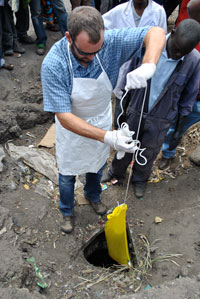Featured stories about SPH people, research and impact.
Read new stories on the SPH Blog
Featured stories about SPH people, research and impact.
Read new stories on the SPH Blog
In collaboration with three Native communities in the western United States, University of Washington researchers are embarking on one of the largest alcohol addiction-treatment trials ever conducted among American Indian and Alaska Native adults.
Reducing fossil fuel use and adapting to climate change already underway could result in major health benefits, according to a new study co-authored by Dr. Howard Frumkin, dean of the University of Washington School of Public Health.
A case-control study led by a University of Washington School of Public Health doctoral student found no association between wearing bras and increased breast cancer risk among postmenopausal women. The study was published in Cancer, Epidemiology, Biomarkers & Prevention, a journal of the American Association for Cancer Research.
More than half of Seattle-area travelers who went abroad and fell ill never sought health-related advice before they left, according to a new study led by Dr. Atar Baer, epidemiologist with Public Health – Seattle & King County (PHSKC) and affiliate professor of epidemiology at the University of Washington School of Public Health.
A greater prevalence of health symptoms was reported among residents living close to natural gas wells, including those drilled by hydraulic fracturing, according to a study led by researchers at the University of Washington School of Public Health and Yale School of Public Health. The study appears online September 10, 2014 in Environmental Health Perspectives, a journal of the National Institutes of Health.
A whooping cough epidemic in 2012 in Washington state did not significantly change statewide vaccination rates, according to a study by the University of Washington School of Public Health.
Judith Wasserheit, the vice chair of UW's growing Department of Global Health, has been named the new chair of the Department effective Sept. 1. She is only the second chair since the Department was founded in 2007.
The National Alzheimer's Coordinating Center, located in the Department of Epidemiology at the University of Washington School of Public Health, has received funding for another five years at $19.7 million. Since its founding in 1999, the center will have been funded continuously by the National Institute on Aging, one of the National Institutes of Health.
Associate Professor Edmund Seto of the Department of Environmental and Occupational Health Sciences is working with a low-income, primarily Latino community in Imperial County, CA, to measure air pollution using mobile devices he developed. The community has consistently had one of the highest asthma hospitalization anMod emergency room visit rates in the state for school-aged children.
Dr. King Holmes, professor and chair of the Department of Global Health at the University of Washington School of Public Health, was one of nine new experts appointed to the National Institute of Health's Council of Councils. The council is made up of 27 members who provide advice to Dr. James Anderson, NIH director on policies and activities of the Division of Program Coordination, Planning and Strategic Initiatives.
HIV persistence despite antiretroviral treatment depends in part on which human genes the virus integrates, according to a new study by the University of Washington Schools of Public Health and Medicine, Seattle Children's Research Institute and the Fred Hutchinson Cancer Research Center.
Dean Howard Frumkin named Professor Patrick Heagerty the new Chair of the Department of Biostatistics within the UW School of Public Health, effective Sept. 1, 2014. Heagerty will succeed Professor Bruce Weir, who has been chair for nine years.

The University of Washington School of Public Health and PATH, a leading international health organization, received an initial $2.4 million grant from the Paul G.
A recent graduate of the University of Washington School of Public Health won a Young Investigator Award at the International AIDS Conference in Melbourne, Australia.
Jillian Pintye, MPH '14, Epidemiology-Global Health, received a $2,000 prize, sponsored by the International AIDS Society and the French National Agency for Research on AIDS and Viral Hepatitis. Five global awards recognize young researchers who demonstrate innovation, originality and quality in the field of HIV research, and are given to the top-scoring abstracts in each of the conference tracks.
Underrepresented students from three Seattle high schools explored public health disciplines this summer through a six-week course offered by the UW School of Public Health. The course is part of the School's outreach into diverse communities to spark interest in potential public health careers and education.
Testicular cancer is rising dramatically among young Hispanic men, according to a new study in the journal Cancer co-authored by Dr. Stephen Schwartz, professor of epidemiology at the UW School of Public Health.
Steroid injections for a common form of back and leg pain known as spinal stenosis may have little or no benefit for patients, according to a new study by the UW School of Public Health and its research partners.
School of Public Health Faculty Promotions, effective July 1:
Neil Abernethy, to Associate Professor without tenure, Health Services
Jared Baeten, to Professor, Global Health, and Adjunct Professor, Epidemiology
Caleb Banta-Green, to Affiliate Associate Professor, Health Services
Anirban Basu, to Professor, Health Services
Parents who refused to immunize their children also tended to turn down fluoride treatments for them, according to a study conducted by Dr. Donald Chi, adjunct associate professor of Health Services at the University of Washington School of Public Health.
University of Washington School of Public Health researchers contributed to a recent study that suggests air pollution from jets could be a much greater health risk than was formerly thought. The study, published in Environmental Science and Technology, found that ultrafine particles from the exhaust of jets using Los Angeles International Airport were detected at twice the normal levels as far as 10 miles downwind from the airport. Pollution levels were up to five times normal levels at five-to-six miles downwind.